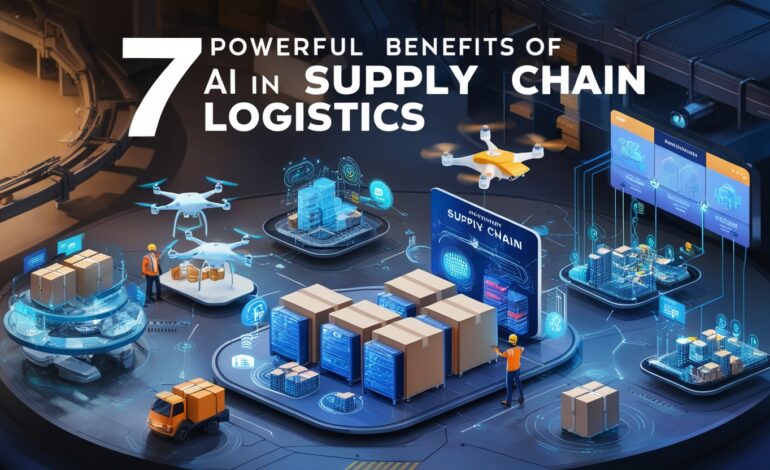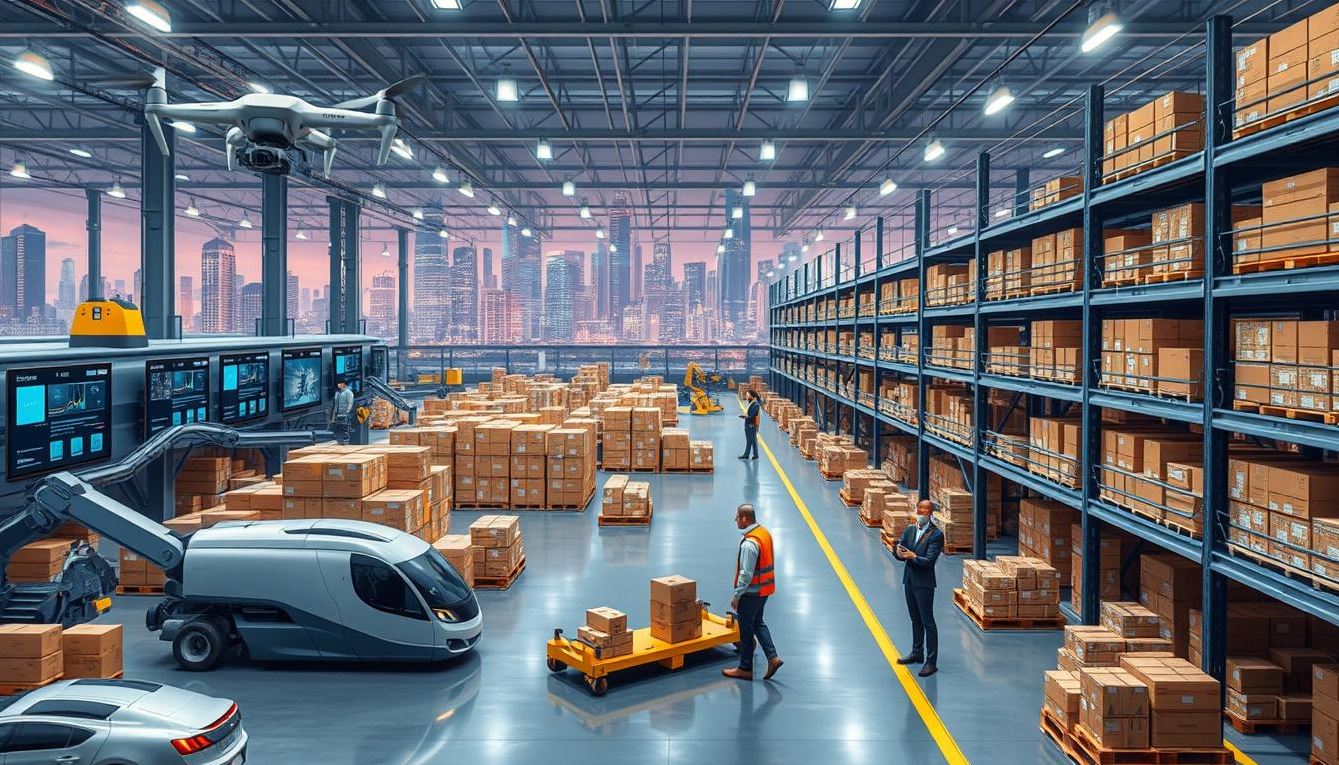
Global supply chain logistics industry is evolving at the rate of knots due to the impact of artificial intelligence (AI). A recent investigation proved that AI could make global supply chains up to 50% more effective. This demonstrates how the use of AI is parade-shifting in the industry.
Here, we will go through the 7 most important shifts that AI is making to supply chain logistics. We will therefore look at how AI is making a big difference in managing operations. This comprises predictive analysis, automatic prediction, and intelligent route determination.
Table of Contents
ToggleAI Supply Chain Logistics
Supply chain logistics and manufacturing in the world have been revolutionized by artificial intelligence (AI). The new tool of AI makes it possible for some companies to run their business. This makes it easier for them to make the right decisions, with some help from the data they have on hand, thus increasing productivity.
Predictive Analytics in Logistics
AI brings a big advantage in supply chain logistics: predictive analytics. It uses lots of data to predict demand, spot problems, and manage stock. This way, companies can avoid waste and keep products in stock when needed.
Intelligent Inventory Management
AI also makes intelligent inventory management possible. It looks at sales, lead times, and storage to find the best stock levels. This cuts down on stock outs and overstocking, saving money and improving operations.
AI is changing how companies handle logistics. It helps them make better choices, please customers, and stay ahead in the market.
Automated Demand Forecasting
In today’s volatile and uncertain business environment, firms are adopting sophisticated technologies including AI. They apply it for purposes of automated demand forecasting. This method involves using a large amount of information on the sales history, overall market trends, and customer behavior.
The self-execution assistance of AI lets companies forecast the future demand successfully. This helps them to easily change their stock value. It avoids stock imbalance and contributes to improved supply chain management decisions being made.
The advantages of AI in demand forecasting are many:
- More accurate demand predictions, reducing stock issues
- Quicker responses to market changes and customer needs
- More efficient inventory management, saving costs
- Supply and demand better match, reducing waste and boosting customer happiness

As supply chain logistics get more complex, automated demand forecasting is more vital than ever. By using AI, companies can stay ahead, save money, and offer better customer service.
| Metric | Before AI-Driven Forecasting | After AI-Driven Forecasting |
|---|---|---|
| Forecast Accuracy | 80% | 92% |
| Inventory Turnover | 5.2 | 7.1 |
| Stockout Incidents | 12 per month | 3 per month |
| Cost Savings | .... | $1.2 million annually |
This is a much bigger increase in supply chain indicators when using the automated demand forecast and containing AI. These results depict how use of AI technology transforms supply chain management and enables firms to be relevant in today’s fast business environment.
Smart Route Planning
With the ever increasing rate of supply chain, artificial intelligence is already a reality as far as the movement of goods is concerned. It does this by providing real time information of traffic congestion, weather conditions and schedules for choosing the best routes. This saves time, reduces on fuel consumption and increases on productivity as far as delivery is concerned.
Real-Time Tracking with AI
AI also helps with tracking goods in real-time. This gives companies a clear view of where their items are. It lets them adjust plans quickly, keeping customers happy and businesses agile.
| Key Benefits of AI-Powered Smart Route Planning | Key Benefits of AI-Driven Real-Time Tracking |
|---|---|
|
|

7 Powerful Benefits of AI in Supply Chain Logistics
AI is now being applied by business to improve its supply chain management. It is very useful for forecasting demand, as well as to optimize settings that include inventory efficiently. They are about altering known practice of business in the related supply system. So here are seven areas where AI is indeed helping.
1. Predictive Analytics for Improved Demand Forecasting: The role of AI is to guess what the customer is interested in so that he or she makes the right purchase. This results to better planning by the business organizations and prevents cases of stock out.
2. Intelligent Inventory Management: There is also flexibility in attending to customer’s stock need since it orders for the stock when it reaches its lowest level. This makes it easier for manufacturers to supply their products with minimum stock depositing meaning that there is lower probability of the products being outdated.
3. Automated Replenishment and Distribution: AI ensures that products reach end consumers as required within the right time at the right price. It also finds better routes and time table.
4. Optimized Transportation and Route Planning: AI helps to discover the fastest and cheap means of delivering products to customers. But it also takes into account traffic and the weather.
5. Real-Time Visibility and Tracking: AI allows businesses to monitor or follow up on shipment in the least possible time. It assists them to make fast decisions with customers to make them happy.
6. Proactive Risk Mitigation: AI is always ready to identify the issues before they affect the running of the business. This allows the businesses to take quick action is some things goes wrong so that things flow as planned.
7. Reduced Costs and Improved Efficiency: AI also enables operations to be streamlined, and costs to be cut. For the businesses it assists in making the correct decisions and reducing expenses.

7 Powerful Benefits of AI in Supply Chain Logistics
Therefore, dealing with supply chain issues when operating in the current dynamic business environment must be addressed. Fortunately, the use of Artificial Intelligence (AI) is revolutionizing how firms approach the management of their supply chains. They introduce new forms of openness and contributes to risk reduction.
Proactive Risk Mitigation
As used in operation management, real-time visibility of operations as provided by AI is the ability of a company to have a look at the supply chain with clarity. Rather, it relies on algorithms, such as data analytics and predictive model approaches. It identifies areas where issues can occur and strategies which can be used to avoid disruption in business operations.
By enhancing proactive risk mitigation, firms are able to address supply chain problems right from the onset. This has the effect of minimizing the effect on your operations and therefore your profits. From this point of view, it enables the leaders come up with good decisions and offer a competitive edge in the market.

Streamlined Logistics Operations
Supply chain management can be optimized by using artificial intelligence to enhance the operations by the firms in the system. We all know that AI is used in automating, optimizing, and making some forecasts. This leads to improvement in cost, resource utilization and efficiency.
It put them in a good position to compete because operation efficiency significantly reduces their costs.
Reduced Costs and Improved Efficiency
Logistics has been revolutionized by the existence of AI. Supply chain and manufacturing applications and related performance also enhance through the help of advanced adopted algorithms, machine learning. This leads to huge cost reduction and optimized work.
AI makes it easier for companies to make right decisions thanks to real time decision support from data analysis. It assists in both reduction of wastage as well as improvement of the logistics productivity.
On the other hand, the use of AI in supply chain has many advantages. It manages inventory automatically, forecast maintenance, and plans route strategically.
FAQ
What are the 7 powerful benefits of AI in supply chain logistics?
The 7 benefits of AI in supply chain logistics are:
1. Predictive analytics for better demand forecasting
2. Smart inventory management
3. Automated replenishment and distribution
4. Optimized transportation and route planning
5. Real-time visibility and tracking
6. Proactive risk mitigation
7. Reduced costs and improved efficiency
How does AI enable predictive analytics in logistics?
AI uses advanced algorithms to analyze lots of data. This data comes from sales history, market trends, and customer behavior.
What are the benefits of AI-powered intelligent inventory management?
AI helps manage inventory levels smartly. It reduces waste and boosts efficiency in supply chains. With AI, companies can make better decisions about when to restock. This leads to better customer service and lower costs.
How does AI enable smart route planning and real-time tracking?
AI optimizes routes using real-time data on traffic, weather, and schedules. This cuts down delivery times and fuel use. AI also tracks goods in real-time. This lets companies monitor their shipments and adjust plans as needed.
What are the benefits of AI-driven supply chain visibility and proactive risk mitigation?
AI gives a clear view of the supply chain in real-time. This helps spot risks early and plan for them. AI suggests ways to avoid disruptions, keeping operations smooth and customers happy.
How can AI help streamline logistics operations and reduce costs?
AI makes logistics operations more efficient and saves money. It automates and optimizes processes, cutting down on costs. This gives companies a competitive edge in the market.




